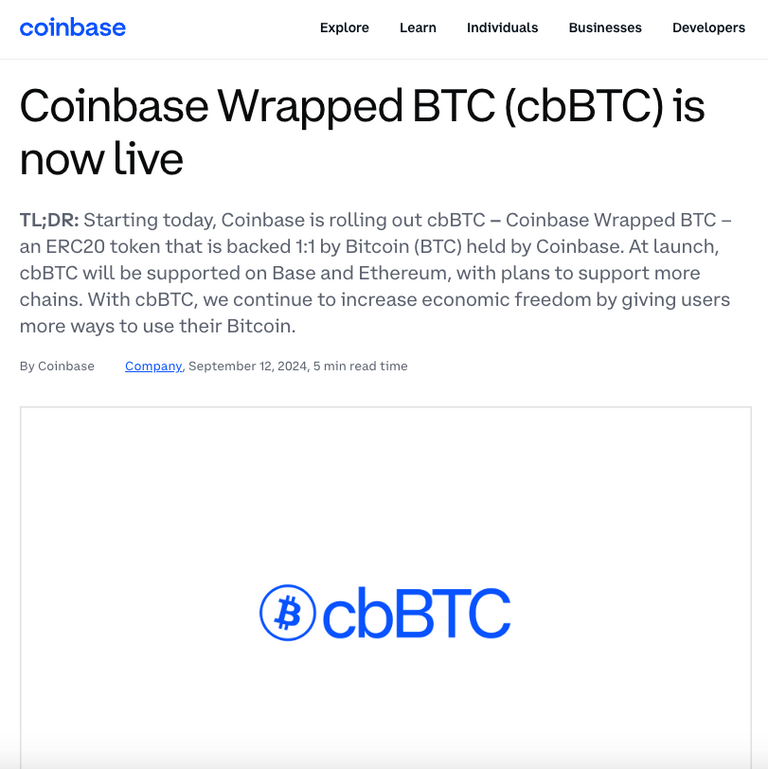In the ever-evolving world of cryptocurrency, a new chapter is unfolding in the wrapped Bitcoin saga. Coinbase, one of the industry's giants, has thrown its hat into the ring with the launch of cbBTC, a new wrapped Bitcoin token that's already making waves in the DeFi ecosystem. This move comes at a crucial time, as the long-standing leader in this space, BitGo's Wrapped Bitcoin (WBTC), faces increasing scrutiny and challenges.

Coinbase announced its own Wrapped BTC on September 12, 2024
A New Contender Emerges
Coinbase's cbBTC, launched on September 12, 2024, is an ERC-20 token backed 1:1 by Bitcoin held in Coinbase custody. Available on both Ethereum and Coinbase's Layer-2 solution, Base, cbBTC aims to bridge the gap between Bitcoin and the burgeoning DeFi ecosystem. Within just 24 hours of its debut, cbBTC's market capitalization surged past $100 million, signaling strong initial interest from the crypto community.
The timing of this launch is particularly noteworthy. It comes on the heels of controversy surrounding WBTC, which has dominated the wrapped Bitcoin market with a 96.6% share. BitGo's recent announcement of a "strategic partnership" involving TRON founder Justin Sun raised eyebrows in the crypto community, leading to concerns about centralization and governance.
The WBTC Conundrum
The issues with WBTC have been brewing for some time. MakerDAO, a cornerstone of the DeFi ecosystem, has been actively discussing the possibility of offboarding WBTC as collateral for its DAI stablecoin. This move, if implemented, could significantly impact WBTC's dominance in the market.
The concerns aren't unfounded. Justin Sun's involvement has sparked debates about the potential centralization of WBTC. While Sun has stated that he doesn't control WBTC, his influence in the joint venture managing it has left many in the community uneasy. The controversy is reminiscent of issues surrounding TrueUSD, another stablecoin project linked to Sun that faced operational and transparency challenges.
Coinbase's Strategic Play
Coinbase's entry into this market with cbBTC is more than just a new product launch; it's a strategic move to capitalize on the growing unease with WBTC. By emphasizing transparency and leveraging its reputation as a regulated, publicly-traded company, Coinbase is positioning cbBTC as a more trustworthy alternative.
The integration of cbBTC with major DeFi protocols like Aave, Curve, Compound, and others right from launch day demonstrates Coinbase's commitment to making cbBTC a key player in the DeFi ecosystem. This wide integration could provide the liquidity and utility necessary for cbBTC to gain significant market share quickly.
The Broader Implications
The rise of cbBTC and the challenges facing WBTC highlight broader trends in the crypto world:
The importance of trust and transparency: As the DeFi ecosystem matures, users and protocols are becoming more discerning about the assets they use and trust.
The power of brand and reputation: Coinbase's established brand in the crypto space could give cbBTC a significant advantage over newer, less-known alternatives.
The ongoing centralization debate: The controversy surrounding WBTC underscores the crypto community's ongoing struggle with the balance between efficiency and decentralization.
The evolving regulatory landscape: As wrapped assets become more prominent, they're likely to attract increased regulatory scrutiny, potentially favoring more regulated entities like Coinbase.
Looking Ahead
While it's too early to declare cbBTC the new king of wrapped Bitcoin, its strong start and Coinbase's clout in the industry make it a serious contender. The coming months will be crucial as the market assesses the security, liquidity, and overall utility of cbBTC compared to WBTC and other alternatives.
For investors and DeFi users, this competition in the wrapped Bitcoin space could bring benefits in the form of improved services, greater transparency, and more options for utilizing Bitcoin in DeFi applications. However, it also underscores the need for due diligence and a clear understanding of the risks associated with wrapped assets and their custodians.
As the situation continues to evolve, all eyes will be on how chains like Solana and protocols like Aave, Compound, and others adjust their risk parameters and collateral policies in response to these new developments. The wrapped Bitcoin market is at a crossroads, and the decisions made in the coming weeks and months could reshape the landscape of Bitcoin's role in DeFi for years to come.